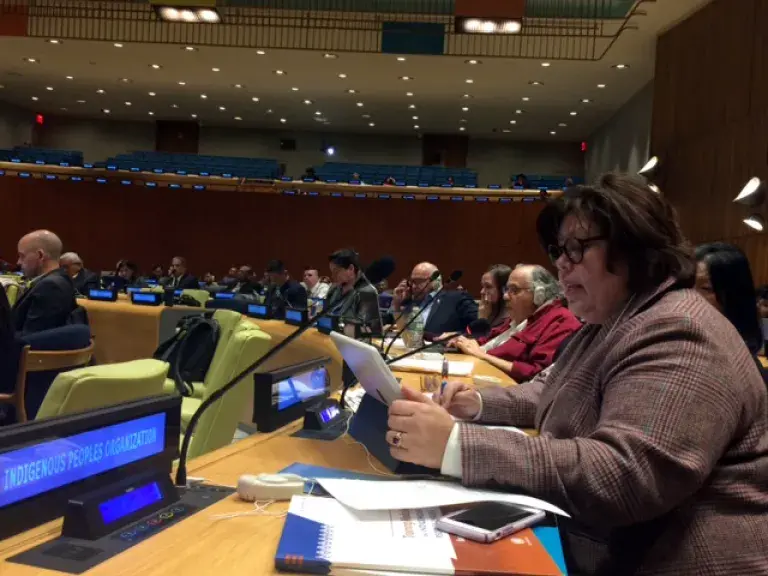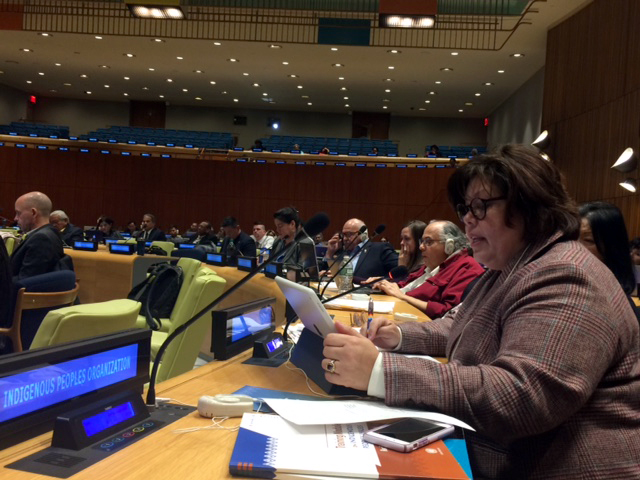
 (New York City, NY) — Indigenous leaders from across the United States and the world gathered in New York December 14-15, 2016, to participate in a consultation with the United Nations General Assembly on how to strengthen the participation of indigenous governments at the United Nations. Tribal leaders are pushing to see the UN formally recognize the distinct character of indigenous peoples and governments through the creation of a new and appropriate status at the UN that would allow them to fully participate in all meetings. Indigenous governing institutions are not presently recognized by the United Nations system as governments.
(New York City, NY) — Indigenous leaders from across the United States and the world gathered in New York December 14-15, 2016, to participate in a consultation with the United Nations General Assembly on how to strengthen the participation of indigenous governments at the United Nations. Tribal leaders are pushing to see the UN formally recognize the distinct character of indigenous peoples and governments through the creation of a new and appropriate status at the UN that would allow them to fully participate in all meetings. Indigenous governing institutions are not presently recognized by the United Nations system as governments.
“This process is about creating a space for indigenous governments at the UN,” said Terri Henry, Secretary of State for the Eastern Band of Cherokee Indians and Indian Law Resource Center board chairperson. “Indigenous governing institutions should have the opportunity to submit documents and proposals, make statements, and take part in United Nations activities on a permanent basis. We should have priority over non-governmental organizations in regards to seating and speaking.”
This consultation process is a response to decisions made at the World Conference on Indigenous Peoples to consider “ways to enable the participation of indigenous peoples’ representatives and institutions in meetings of relevant United Nations bodies on issues affecting them.”
None of the existing participation processes or mechanisms recognizes the distinct political and legal nature of indigenous peoples’ governing institutions according to Karla General, Indian Law Resource Center attorney.
“Without a special invitation, indigenous governing institutions cannot participate in United Nations meetings,” said General. “They are unable even to simply attend and observe sessions of the Human Rights Council or the Third Committee of the General Assembly, which adopt annual resolutions on the rights of indigenous peoples.”
“It’s a high priority for indigenous governments to have their elected representatives participate in these venues and add to the record through this enhanced participation,” said Will Micklin, 2nd Vice President, Central Council of Tlingit and Haida Indian Tribes of Alaska.
Representatives of several Indian and Alaska Native nations, as well as UN member countries, participated in the consultation to exchange views regarding the development of a new status for indigenous governments, including a new UN body to accredit indigenous governing institutions. Participants at the consultation also responded to questions about the accreditation process for indigenous governments and what substantive rights of participation would they have.
The December consultation was the first of four consultations called for by the President of the General Assembly. The second and third consultations are scheduled for January 30-February 1, 2017 and February 27-28, 2017. The fourth consultation will take place between April 24-May 5, although the specific dates are yet to be determined. The previous President convened consultations in early 2016 and developed an elements paper to inform this final round of consultations. The UN General Assembly is expected to make a decision on the matter before its current session ends in September 2017.
Videos and Statements
Informal Consultations on Indigenous Participation at the UN
